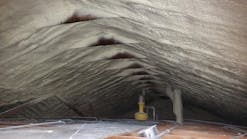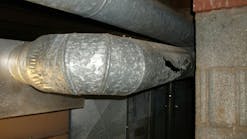Whenever possible, take the conservative approach to coil cleaning. Simply rinse coils with good old H2O (also known as water). There are several reasons for this.
- Interaction with metal in the system
Generally speaking, most high-foaming coil cleaners are either acid- or alkali-based. They clean and brighten the coil by taking a layer of oxide off of it. These types of cleaners will do a wonderful job of taking the deep dirt out of a coil. However, here in the salt air of Myrtle Beach, they can shorten the life of a coil.
I had a few experiences in which I sprayed these cleaners on coils. They would foam up nicely, and definitely helped me remove all the dirt from the fins and all the impacted dirt from the coil. But when I came back the next year, the fins and coil would literally be falling apart. I actually lost a couple of customers who accused me of destroying their coils on purpose, so that I could sell them a new one.
I learned that you must rinse coils after using these cleaners — I recommend 30 minutes minimum — in order to ensure they're not leaving any corrosive coating. Most service technicians don't want to stand around that long to rinse a coil. This is also an unpopular technique in some areas of the country where water is scarce.
This may be a regional issue. I've had this problem with some high-foaming coil cleaners here in the salt air of Myrtle Beach, which I didn't encounter earlier in my career as a service technician in Pennsylvania. But, it's something to be aware of. Also, be aware that you'll want to wear rubber gloves when working with these types of cleaners, as they can burn or irritate your skin.
- Wicking between joints
High-foaming cleaners work by taking the outside layer of oxide off the coil fin. This actually improves heat transfer, because it exposes the bare metal underneath. However, these cleaners can also wick between the area where the coil fin and the tube bond together. That's typically a mechanical connection between a copper part and an aluminum part. If a strong, acid- or alkali-based cleaner wicks in and degrades that connection over time, heat transfer from the tube to the fin is reduced.
- Runoff, pets, and plants
Some coil cleaning products that we use at O'Neill-Bagwell Cooling & Heating are biodegradable. Yet even these, which typically come in the form of a powder that you mix with water, are slightly poisonous. Their labels specify that if these products are ingested, you should not induce vomiting, drink plenty of water or milk, and contact a doctor right away.
I doubt that many service technicians are putting spoonfuls of coil cleaner in their morning coffee. However, that doesn't mean that these products, even when properly diluted, might not kill grass or plants that they come into contact with. And what about your customers who have pets? Even a very slightly poisonous mixture of coil cleaner could make the family dog sick if it laps up a puddle of the stuff.
There Are Exceptions
That's not to say that you'll never find a need for a stronger coil cleaner. These products definitely have their place. In some cases, an outdoor condensing unit may be near a dryer vent, or a downdraft blower from a kitchen may be discharging onto or near the unit. In these cases, or in the event of a coil that may never have been cleaned in 10 years and is filled with highly impacted dirt, water may not do the trick. In these cases, you'll need something to help you dissolve and remove the dirt or grease. But I suggest that you make these the exception rather than the rule.
I'm not trying to bad-mouth coil cleaning products. Even the strongest ones have a place. But, like doing a job with a sledgehammer, they should only be called upon when you need them.
A final thought on the subject: If you take care of a customer's system when the coil is brand new, it's unlikely that the coil will ever become dirty enough to require the strongest cleaners. This is yet another in the long list of reasons to sell maintenance agreements.
A new era of green thinking is sweeping the nation. Educate your customers about the many ways your annual HVAC system clean and check can help them keep it running clean and green.
Kevin O'Neill, CM, is the co-owner of O'Neill-Bagwell Cooling & Heating, Myrtle Beach, SC. He has 31 years experience in the HVAC service business, is a 24-year member of RSES, and was a finalist in the 2005 NATE Certified Technician Competition. Kevin can be reached at 843/385-2220; e-mail [email protected].








